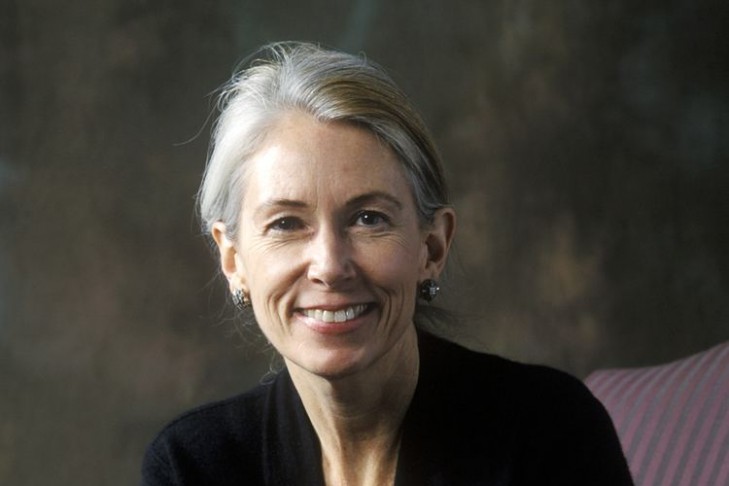Before there was the #MeToo movement, there was Catharine MacKinnon. MacKinnon, a noted lawyer and activist, is credited with bringing the legal claim of sexual harassment to the public arena. For over four decades, MacKinnon has also been a beacon in the field of women’s legal rights and gender crimes. Last week she delivered the 10th Annual Diane Markowicz Memorial Lecture on Gender and Human Rights at Brandeis University. The lecture is in memory of Diane (Dina) Markowicz, a Brandeis student in the 1970s who died at the age of 20. Markowicz was a passionate human rights activist who made her mark in the Soviet Jewry movement. Sylvia Neil, Markowicz’s sister, and her husband, Dan Fischel, sponsor the lecture to “perpetuate Diane’s work and memory, as part of their grant initiating the Project on Gender, Culture, Religion and Law.”
MacKinnon’s hour-long talk included an overview of her impressive career, as well as an assessment of the #MeToo movement, which she described as “the world’s first mass movement against sexual abuse. [A movement] that is transforming cultures all around the world.” That transformation is akin to what MacKinnon describes as “butterfly politics.” The term is also the name of her new book, a compendium of her activism on behalf of women.
The “butterfly effect” famously asserts that if a butterfly opens its wings in the Amazon, it eventually creates a tornado in Texas. The resulting #MeToo movement, said MacKinnon, is the tornado. According to her, #MeToo is the “culmination of the butterfly effect. What was an early flutter of defining sexual harassment is now an experience and a violation as part of inequality.” Accordingly, the movement is international, and at this moment in history shows no signs of stopping. MacKinnon attributes such strength in part to the diligent reporting of outlets such as The New York Times and testimonies from #MeToo survivors on social media.
MacKinnon observed that the social burden of proving sexual harassment often telegraphs the old and outrageous cliché that woman wanted or deserved such harassment. To that end, it typically took three or four women who were violated by the same man and in the same way “to make a dent in his denial. This made a woman one-fourth of a person. Even when she was believed, what would happen to him? His value outweighed her sexualized worthlessness.”
MacKinnon’s point was evident in her analysis of Brett Kavanaugh’s Supreme Court nomination hearings. “In some ways,” said MacKinnon, “it was worse for [a woman] to be believed and not have anything matter. It means she didn’t matter. This precise choreography was retraced in the Kavanaugh hearing.” Despite the fact that many people believed Dr. Blasey Ford, she was “negligible. [Justice Kavanaugh] counted. His sniveling enraged display of toxic masculinity fooled just enough people long enough. It was [an example of] compartmentalized masculinity, which is femininity’s equivalent of disassociation.”
MacKinnon also observed that the dynamics of inequality have been integral to the system of sexual politics. In short, the more power a man has, the more sexual access he can get. However, since 2006, when Tarana Burke “laid the conceptual cornerstone of the #MeToo movement,” some court cases have reflected the impact of #MeToo, as well as Anita Hill’s testimony detailing Justice Clarence Thomas’ sexual harassment.
In 2017, the #MeToo movement became a tidal wave. The actor Alyssa Milano accused the movie mogul Harvey Weinstein of sexual harassment. Using the now-famous hashtag #MeToo, Milano invited women to share their stories of harassment. In less than two days, almost 2 million women responded with their accounts of sexual violence. The butterfly effect was in full motion and revealing the allegations against Weinstein was akin to throwing a match into a tinderbox.
To drive her point home, MacKinnon asserted that Bill Cosby’s first trial, in which he was accused of doping and assaulting women, ended in a hung jury. After #MeToo broke, Cosby was found guilty and sentenced to jail at his second trial. Similarly, #MeToo was responsible for Larry Nassar’s conviction. Nassar has been sentenced to a lifetime in prison after scores of young women accused him of sexual assault. “#MeToo,” said MacKinnon, “is directly responsible. There had been multiple reports over the years against Nassar by many of these young women, who were ignored.”
MacKinnon concluded her lecture with the strong declaration that the only legal remedy that matches the #MeToo movement’s scale is an Equal Rights Amendment. Such an amendment, said MacKinnon, would expand congressional power to legislate against sexual abuse. “It could renovate judicial interpretations of inequality in a more substantive direction,” she said. “It could reconfigure equality itself by guaranteeing sex equality under the constitution for everyone.”



